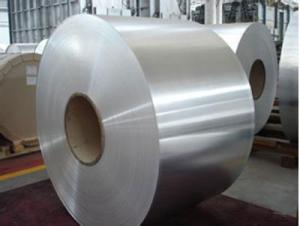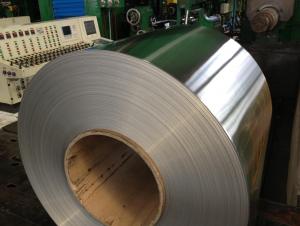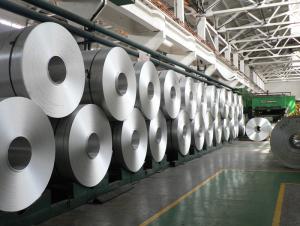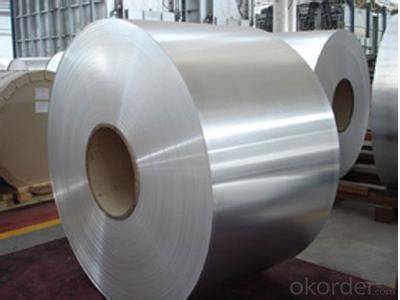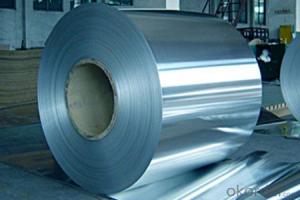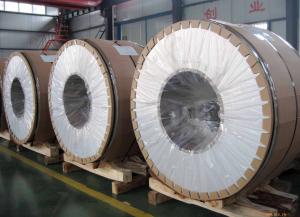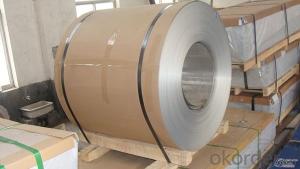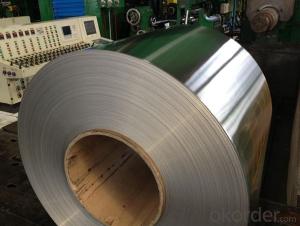3 X Mill Finished Aluminum Coil for Polyester Coating
- Loading Port:
- Shanghai
- Payment Terms:
- TT or LC
- Min Order Qty:
- 5 m.t.
- Supply Capability:
- 5000 m.t./month
OKorder Service Pledge
OKorder Financial Service
You Might Also Like
1.Structure of Mill Finished Aluminium Sheet for Polyester Coating
Mill Finished Aluminium Sheet for Polyester Coating is one semi-finished aluminium material. This strip can be rolled down to aluminium coil,sheet,circle ect. The alloy AA1050 is widly used in building, industry ect. Its weight is much lower than steel. So many customers choosed aluminium material instead of steel.
2. Main features of Mill Finished Aluminium Sheet for Polyester Coating
a.Competitive price---We have our own mills and can produce mill finished aluminium coils, so we can control the production cost better.
b.Professional after-sale service---We have more than 15 years exportation experience and you need not worry about the exporation problems.
c.Fast delivery time---We can control the delivery time within 35 days.
3. Image
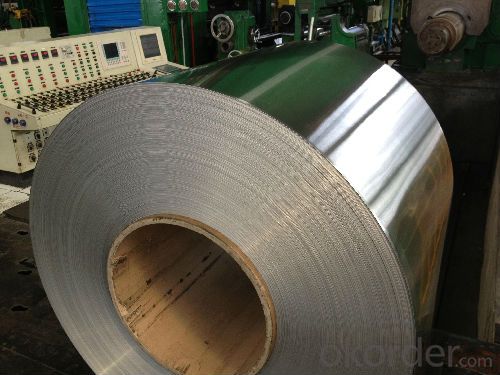
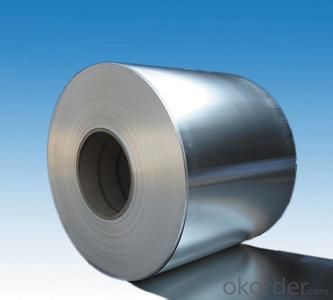
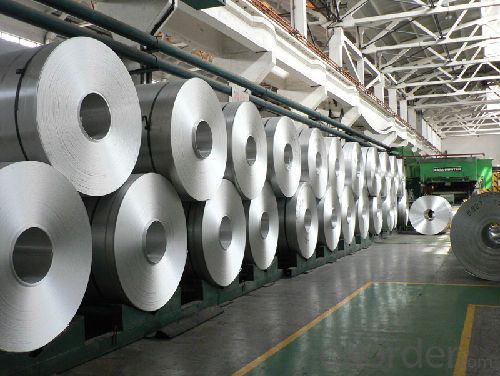
4. Product Specification
| Alloy | Temper | Coating | Time | Weight |
| AA1050 | H14 | Polyester | 15 year | 2 tons |
5. FAQ
What is the quality standard?
---Usually our standard is GB3880-2006
What is the largest width?
---It is 2300mm
What is the MOQ?
---Usually we can accept 80 tons.
- Q: Can aluminum coils be used in electrical applications?
- Indeed, aluminum coils possess the capability for utilization in electrical applications. Its abundance in electrical wiring is attributable to its cost-effectiveness and superior conductivity in comparison to copper. Transformers, motors, generators, and other electrical apparatuses commonly rely on aluminum coils. Nevertheless, it is essential to acknowledge that copper surpasses aluminum in terms of electrical conductivity, necessitating the use of larger aluminum coils to attain equivalent levels of conductivity. Moreover, the implementation of specialized insulation and connectors becomes imperative for aluminum coils to prevent corrosion and guarantee appropriate electrical connections.
- Q: Are aluminum coils suitable for insulation jacketing?
- Yes, aluminum coils are suitable for insulation jacketing. Aluminum is a popular choice for jacketing material due to its excellent thermal properties, durability, and corrosion resistance. It is widely used in various industries, including HVAC, oil and gas, and petrochemical, for insulating pipe systems and equipment. Aluminum coils provide a protective covering around insulation materials, preventing moisture ingress and maintaining thermal efficiency. Additionally, their lightweight nature makes them easy to install and transport. Overall, aluminum coils are a reliable and effective solution for insulation jacketing applications.
- Q: I have found many articles claiming that the aluminum content in soy (baby) formula is very high.What I am wondering is- does regular old soy milk for adult consumption also have very high aluminum content?I am extensively researching all possible ways to relieve my 14 month olds terrible constipation. He is not allergic to milk- he was on a milk-based formula. We VERY slowly switched over to whole cow's milk- which turned out to once again be terribly constipating. It was suggested I give lactose-free milk a try- which has seemed to help a little bit- it was working OK for a few days- but he did have quit the hard (and painful) bowel movement a couple days ago. We are trying other options- juices, he's active, we are trying to get enough fiber into this picky eater's diet. I am just researching the possibility of soy milk if this problem persists.I am not willing to give it to him if the aluminum content is even a small possibility. I am not finding much info about adult soy milk. Anyone??
- Soy is known to have a lot of hormones in it. Not good for a growing baby. A study even showed that female infants that were fed soy formula went into puberty a lot sooner than girls that were fed breastmilk or regular formula.
- Q: Are there any limitations to using aluminum coils?
- Yes, there are certain limitations to using aluminum coils. One limitation is that aluminum has a lower tensile strength compared to other metals like steel, making it more prone to damage or deformation under heavy loads or impacts. Additionally, aluminum coils can be susceptible to corrosion if not properly protected or coated. Finally, aluminum coils may not be suitable for applications that require high electrical conductivity, as aluminum has a lower conductivity compared to copper.
- Q: This question asks about potential safety hazards when using electric heaters that have aluminum coils.
- <p>While electric heaters with aluminum coils are generally safe when used properly, there are some safety concerns to consider. Aluminum can heat up quickly and may become very hot, posing a risk of burns if touched. Additionally, aluminum coils can corrode over time, potentially leading to electrical shorts or fires. It's important to ensure that the heater is not covered or obstructed, as this can cause overheating. Always follow the manufacturer's instructions for use and safety precautions. Regularly inspect the heater for any signs of damage or wear, and never use a heater with a damaged cord or plug.</p>
- Q: Can aluminum coils be used in electrical cables?
- Electrical cables can indeed incorporate aluminum coils. Aluminum is widely utilized as a material for electrical conductors due to its exceptional electrical conductivity and comparatively lower cost when compared to copper. Its usage is particularly prominent in power transmission and distribution cables that necessitate long-distance transmission. Overhead power lines and underground cables often employ aluminum coils. However, it is crucial to acknowledge that aluminum possesses a lower tensile strength than copper, requiring careful design and manufacturing of the cables to ensure sufficient mechanical strength. Furthermore, achieving the same electrical performance with aluminum conductors necessitates larger cross-sectional areas compared to copper, potentially resulting in slightly larger cable sizes.
- Q: Can aluminum coils be used in heat sinks?
- Yes, aluminum coils can be used in heat sinks. Aluminum is a popular choice for heat sinks due to its excellent thermal conductivity. Heat sinks are designed to dissipate heat from electronic components and other devices to prevent overheating. The use of aluminum coils in heat sinks allows for increased surface area, which enhances heat dissipation. The coils can be shaped and arranged in various configurations to optimize cooling efficiency. Additionally, aluminum is lightweight, corrosion-resistant, and cost-effective, making it a practical choice for heat sink applications.
- Q: Will the aluminum braking surface dissipate heat evenly allowing for fast stops from fast descents or will I have to still pulsate braking to reduce heat build up in the tires and tubes?
- Aluminum works just fine. Basalt is overkill for this application. Aluminum has been used on many applications for its heat dissipating properties such as heatsinks, radiator fins etc. Regardless of wheel material, pulsate braking is a technique used to control downhill speed.
- Q: A certain ionic compound is made entirely of aluminum and oxygenWhat is the formula for this compound?
- Aluminum Oxide Al2O3
- Q: 94 f150. have the stock wheels which are weathered and dull. whats a good way to bring the shine back? some of the original coating is there ,most is gone. tried mothers aluminum wheel polish,does nothing. is it wise to use a wire wheel in a drill to get down to just the aluminum? the wheels are those with the center plastic cap with holes around the outer edge.thanks for any info
- Get a couple of those Mothers power balls .If the clear coat is coming off Then dirt is embedded in the rim The best way is to have them polished by a pro .If thats not the route you want to go ,the power ball is about the only thing that can help you out and for much cheaper than having a pro do it .Not to mention doing it by hand just sucks .But it would take two at least to do all 4 wheels Then the polish will do what its advertised to do or use any polish you want You will need to at least remove the wheel off the truck for the best results If you strip the rims or use acidic cleaners to remove the remaining clear coat It may take more materials Like polish ,Pads,or the power ball thing Cause it will leave a raw aluminum surface which usually requires more time and labor to polish out DON'T WIRE WHEEL THE RIMS OKAY YOU WILL SCRATCH THEM SO DEEP YOU WILL RUIN THEM NO ABRASIVE MATERIALS ARE TO BE USED ON A ALUMINUM RIM NOT EVEN A WIRE WHEEL OF ANY TYPE OR MATERIAL SHOULD BE USED ON THE RIM what you'll do is make them uglier Cause pitting strip the surface leaving a porous and uneven surface Which corrosion likes to form on .Thats the worst and the wrong way to clean aluminum and even steel sometimes depending on what it is But NEVER aluminum
Send your message to us
3 X Mill Finished Aluminum Coil for Polyester Coating
- Loading Port:
- Shanghai
- Payment Terms:
- TT or LC
- Min Order Qty:
- 5 m.t.
- Supply Capability:
- 5000 m.t./month
OKorder Service Pledge
OKorder Financial Service
Similar products
Hot products
Hot Searches
Related keywords
